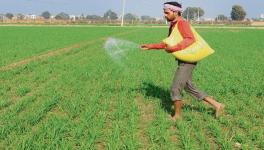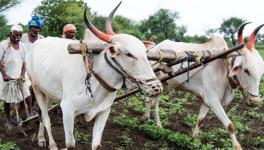Waterlogging, Crop Damage, Govt Apathy: Three-Pronged Affliction of Haryana Farmers
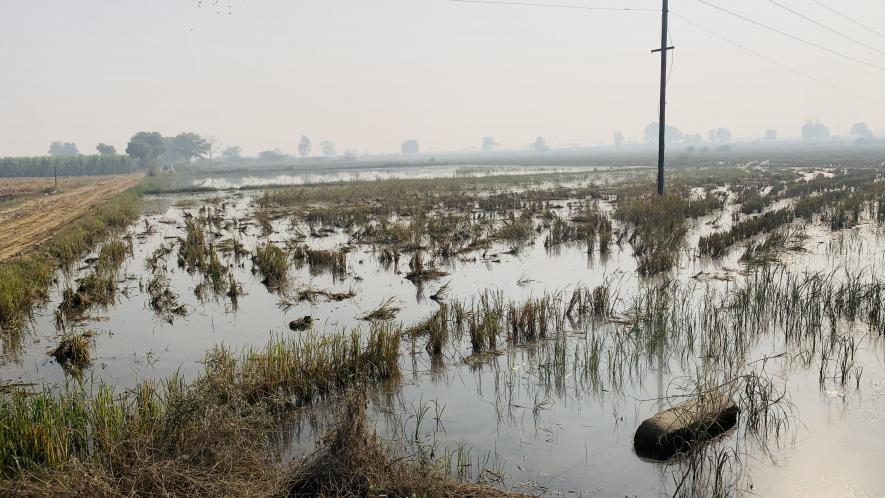
It’s already noon, and Kaptan Singh and his friends have assembled at the verandah of the house to share the hookah and discuss their private and social lives. Amid many pressing issues, what perturbs Singh and his friends the most is the stagnant rainwater in their farms that is killing all prospects of income by making paddy, cotton and Bajra crops rot.
The hopes for sowing wheat have also vanished now. Singh tells NewsClick that Jind, Rohtak, Sonipat and Panipat districts in central Haryana witnessed heavy downpour in the last weeks of October and the first week of November this year. The untimely rains hit crops so hard that the farmers could not extract a single ounce of paddy. They expected that the water would soon dissipate, and they would be sowing wheat to cover their losses. However, this possibility is now gone as the farms remain inundated.
Showing his farms, Singh says that the problem began in 2014 when they first noticed that rainwater was not percolating into the land and damaging the crops. “When it first began, we found that only a few bighas had this problem. With passing years, the problem only worsened as more land remained inundated. We carried on with our lives because we were able to get some produce every year. But this year, we have lost all of the crops,” he says. Since we expected that the crop would be damaged, we insured it every year. Even as nature hit us badly, the government played a cruel joke on us by adding the condition that we would not get any compensation if the crops were damaged by waterlogging. After putting money and effort, we have been met with sheer ridicule and humiliation now!”
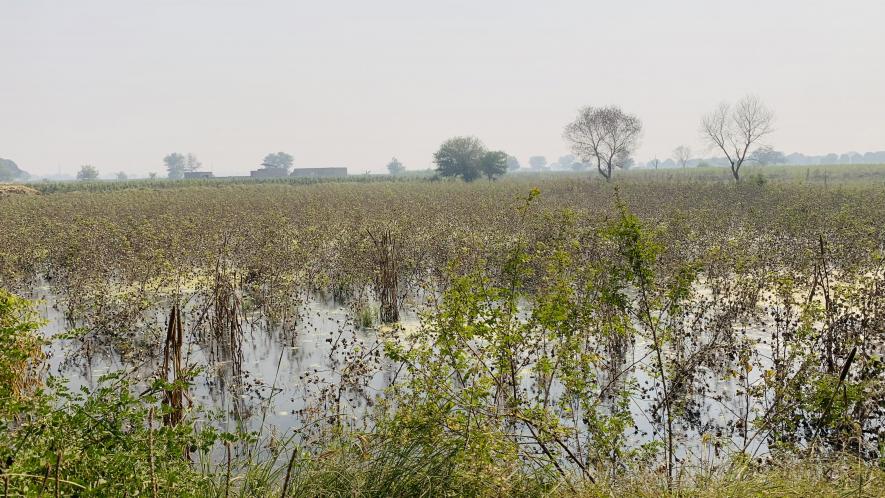
Under Pradhan Mantri Fasal Bima Yojna, the Centre issued a notification in 2019 stating that the farmers will not be eligible for any compensation if the crops are affected by waterlogging. The operational guidelines of Pradhan Mantri Fasal Bima Yojna on its official website state, ”Inundation peril is not applicable in case of hydrophilic crops like Paddy, Sugarcane Jute & Mesta.”
Singh, a resident of Karsola village in Jind district, maintains that the residents have lost 2,000 acres of farms to waterlogging, and no government official came to take stock of the situation. ”I had crops in my 30-acre farm insured, but I have not received a single penny yet! I am paying about Rs 51,000 in premium alone. If they cannot pay compensation, why do they deduct money from my bank account,” Singh says, adding that the tenant farmers are the worst affected lot as they invest about Rs 50,000 in rent and a similar amount on inputs including labour, insecticides, pesticides, herbicides, and fertilisers on Paddy and Cotton. Yet, there is no income. ”We do not know how to deal with this situation. Should we consume poison or commit suicide?” he asks.
Pawan Kumar, another farmer, deciphers the maths of costs involved in the cultivation of Bajra. He sowed the crop in 1.5 acre of land and could get only eight quintals after the huge damages. Disappointed by the apathy, he refused to sell it at a market price of Rs 1,200 per quintal against the minimum support price of Rs 2250 per quintal. “If I were to calculate the accumulated cost for Bajra, it would be around 12,000 per acre, whereas the current yield would only fetch Rs 9,600 for eight quintals of Bajra. Please note that the cost of rent at around Rs 25,000 per season will be paid by tenants too,” Kumar says.
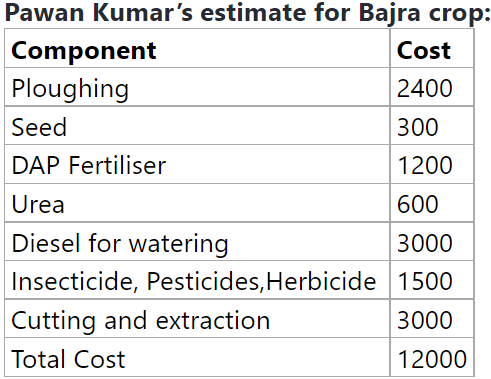
The conversation also revealed that the farmers in this part of the state did not get a single penny under Haryana Bhavantar Bharpai Yojana, which was brought to pay the deficit amount to affected farmers who could not sell their produce at the minimum support price (MSP). The scheme introduced in 2016 was aimed to provide stimulus to the farmers growing vegetables and fruits, including potato, tomato, guava, carrot, brinjal, and kinnow. It was supposed to pay them the deficit amount per acre if they failed to earn between Rs 48,000 to Rs 56,000 per acre.
In its announcement on September 29, 2021, the Government of Haryana declared that it has included Bajra in its list and will pay Rs 600 per acre to farmers who could not sell their produce at MSP. “Not a single person got the benefit in Julana block,” claims Narendra Kumar, President, Bharatiya Kisan Union (Tikait), who goes on to add that there have been consistent attacks on people organising farmers in the ongoing farmers’ movement. “The supporters of the government are watching us closely and finding ways to weaken our efforts. There are discreet attempts to force us to return the compensation amount we received last year for damage to paddy and cotton,” he says.
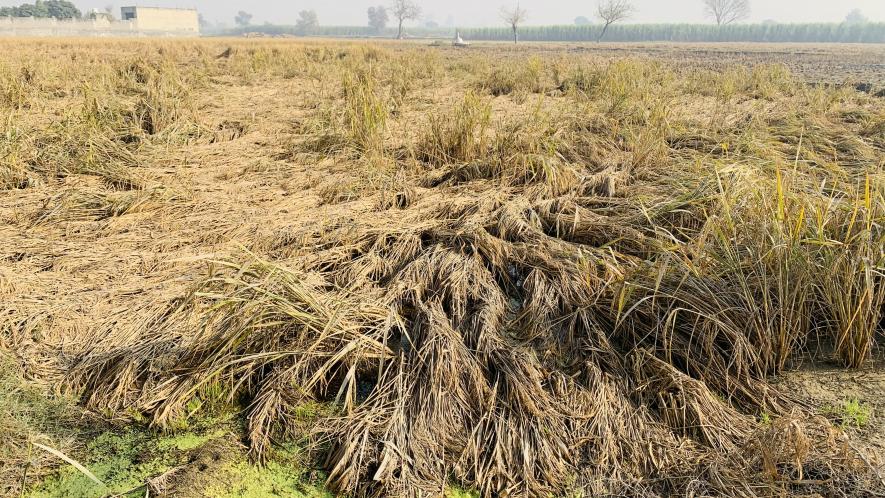
The farmers maintain that the damaged crops and less returns are not only taking a toll on their financial health but also ruining the future of bright students from these families as well. Ved Mitra, another farmer, tells NewsClick that he could not get his children admitted in the eleventh standard due to lack of money even though they showed keen interest in studies. Mitra says, “The teachers in the school demanded six thousand rupees at the time of admission. I could not arrange it then. They now help me in farm work. The farmers here get loans for agriculture and running livelihood but they cannot pay it if the administration does not take action for draining out this water!”
NewsClick travelled to another neighbouring village Buddha Khera where residents have lost 900 acres to the water logging in the farms. Dinesh Kumar, another farmer, tells NewsClick that his biggest concern remains the huge interest levied by money lenders as he took loans for agriculture. He says, ”The crops have been submerged, and there is no hope for next one too. However, the person who gave me the money will be counting his interest without any concession. It’s a double blow for us!” When asked if they agree with Samyukta Kisan Morcha’s decision to go to Parliament for a bill to secure legislation for fair and remunerative prices, Kaptan Singh says, “Those who are dying every day have gone to the [Delhi] borders. Agitation is our last hope. We will be reaching borders in large numbers. Right now, we are mobilising resources now!”
Dr Baljeet Bhayan, a scientist and former district horticulture officer who has closely observed the waterlogging and crop damage phenomenon, tells NewsClick that climate change is ravaging crops in the state, and the calculated silence of governments and multinational corporations is amplifying the crisis. He says, ”The crop damage in this area has two factors: waterlogging and pink bollworm. We are observing a pattern of untimely rains in the region.” He explains that the groundwater is quite saline in this area and should not be used for agriculture. As there is no other source of water for irrigation, the farmers use the groundwater through tubewell. This water harmed the soil, and thus, it has lost its absorption capacity. “That is why water cannot percolate down the ground. So, the farmers will have to change the pattern of agriculture, be it through drip irrigation or sprinklers, depending upon the availability of irrigation water,” Dr Bhayan says.
Secondly, for Pink Bollworm, he says observation has revealed that it has built its resistance against Bt Cotton. “It will be ravaging the crops in a bigger area in upcoming years. In this context, there should be some responsibility fixed against the seed companies who sell expensive seeds with the promise that it is pest resistant and no pest can harm your crop. We are finding that the farmers can control the menace without spending thousands of their hard-earned money on insecticide and pesticides!” he concluded.
Get the latest reports & analysis with people's perspective on Protests, movements & deep analytical videos, discussions of the current affairs in your Telegram app. Subscribe to NewsClick's Telegram channel & get Real-Time updates on stories, as they get published on our website.











